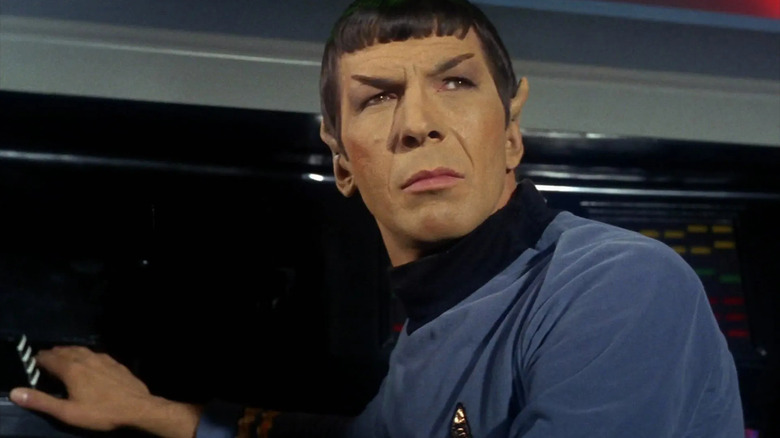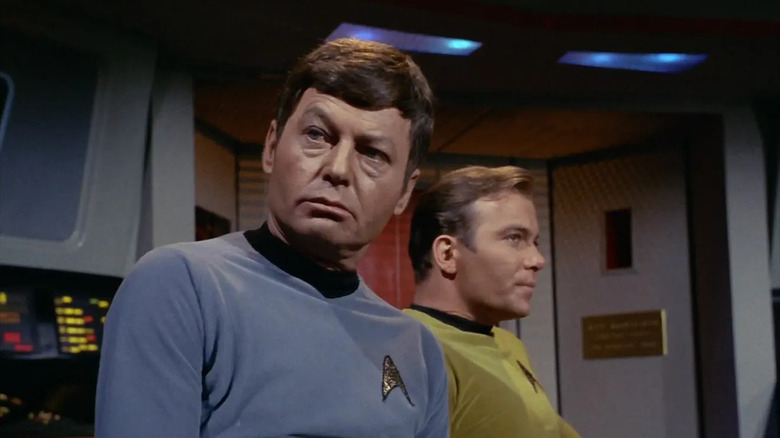The Classic Star Trek Theme Song Actually Has Lyrics — And They're Hilariously Cheesy
The original theme music for Gene Roddenberry's 1966 sci-fi series "Star Trek" was composed by Alexander Courage, a long-time orchestrator who had worked on the scores for the film versions of "Show Boat," "Gigi," and "Seven Brides for Seven Brothers." He also contributed incidental music to TV shows like "Daniel Boone," "Eight is Enough," "Lost in Space," and "Voyage to the Bottom of the Sea." "Star Trek" is the only main theme that he composed.
In an interview with the Archive of American Television, Courage once noted that his main inspiration for "Star Trek" was a 1930 train-based pop song called "Beyond the Blue Horizon," as written by Richard Whiting and W. Frank Harling. Notably, however, his theme is more 1960s pop opera than croony jazz. The soprano that sang the "Star Trek" melody was named Loulie Jean Norman.
The first four notes of Courage's theme — E, G, B, C — have been incorporated into "Star Trek" spinoff series and movies ever since 1966. The first portion of Courage's theme was even re-used for "Star Trek: The Next Generation" in 1987, although the main section of the "Next Generation" opening theme was recycled from Jerry Goldsmith's theme for "Star Trek: The Motion Picture."
Although he was the only one who wrote the music, Courage isn't the only credited writer. Roddenberry is noted in the show's credits as a co-author of the theme. This is pretty well-known trivia among Trekkies, but Roddenberry, without Courage's knowledge, decided to pen some pseudo-deep, space-age lyrics for the "Star Trek" theme song without any intention of recording them or including them in the show. In writing lyrics, though, Roddenberry could declare himself a co-writer of the music ... and collect any subsequent royalties. It was a pretty dastardly thing for Roddenberry to do, especially given that "Star Trek" itself takes place in a friendly, post-capitalist utopia.
And brother, are his lyrics strange and bad.
Gene Roddenberry scammed Alexander Courage out of half of his Star Trek royalties
This has all been confirmed by Snopes and is no mere rumor that persists through "Star Trek" lore. Gene Roddenberry did indeed pull a fast one on Courage. It seems that when "Star Trek" initially ran, Courage was offered a plum deal, receiving royalties for every time the theme ran (which, of course, was once per episode and once per rerun). That one theme was going to make Courage rich or, at the least, comfortable. It seems, though, that Roddenberry saw an opening for a scam, and slipped in to claim authorship of the "Star Trek" lyrics, which were published but never recorded. Having two authors meant every single royalty had to be split in half. Courage only got 50% of what he was owed, while Roddenberry got the other 50%. Unfair? Most certainly.
Indeed, some reports say that Courage refused to come back to "Star Trek" after its first season because Roddenberry had bilked him. (Other composers took his place.) The lyrics, as mentioned, are pretty corny too:
Beyond the rim of the starlight.
My love is wand'ring in star flight.
I know he'll find in star-clustered reaches.
Love, strange love a star woman teaches.
I know his journey ends never.
His star trek will go on forever.
But tell him while he wanders his starry sea,
Remember, remember me.
Knowing the actual melody of Courage's "Star Trek" theme, it's difficult to work out the actual meter of Roddenberry's lyrics. And what's that about someone "wand'ring in star flight" and a "star woman" teaching us about love? Is it a song about longing? These things aren't part of "Star Trek" or its themes of peace and diplomacy. The truly awful theme song to "Star Trek: Enterprise" (an abysmal Rod Stewart ballad called "Faith of the Heart") was more on-point than this.
It was a scam, but at least it was also terrible.

